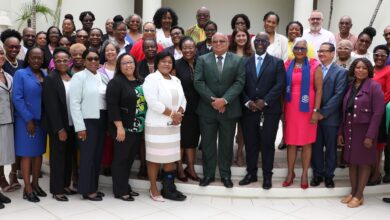(CARICOM Secretariat, Turkeyen, Greater Georgetown, Guyana) I am honoured to address you this morning on behalf of the Minister of PHE who is at Cabinet and unable to attend and the Minister of State who is unwell.
The present Global economic crisis has been likened to the Great Depression of the 1930s that had widespread repercussions around the world. The Small Island Developing states of the Caribbean and our mainland neighbours who are also on the road to development, have all been affected by this downward spiraling global economic trend. Like a Hurricane that wreaks havoc on a fragile small island or vulnerable coastline, our Caribbean Communities have been shaken by financial events whose roots and origins were largely outside of the sphere of our influence.
We are not alone in having been caught off-guard and ill prepared for this crisis. The British newspaper The Observer reported recently that Her Majesty Queen Elizabeth II had demanded of thinkers and scholars of the London School of Economics a reason as to why no one had anticipated the credit crunch. The eminent economists have since written a collective apology to the Queen stating that “the failure to foresee the timing, extent and severity of the crisis and to head it off, while it had many causes, was principally a failure of the collective imagination of many bright people, both in this country and internationally, to understand the risks to the system as a whole.” Worst yet, the “financial wizards” were deemed to have been guilty of “wishful thinking combined with hubris.”
The development of our Caribbean region must be founded in reality and backed by sound knowledge and experienced-based choices. We cannot afford the luxury of wishful thinking when it comes to our future and we cannot bask in a misconceived idea of ourselves, our needs or our potential. The effects of the global crisis are as inescapable as other global challenges such as climate change and sea-level rise. Yet, the present reality can actually afford us an opportunity to plan new and innovative ways to safeguard our futures to the end that we will not again fall prey to such an economic crisis.
This meeting seeks to explore the development of a monitoring framework comprising a coherent set of official statistics that are useful in providing policy makers and analysts, with an information base to understand the nature of the present economic crisis and to monitor and report on the transmission mechanisms that may give rise to systemic risks and vulnerabilities of the Region’s economies.
Statisticians, economists and demographers are vital for the monitoring of socio-economic trends, profiling our societies, assessing our investment risks and showcasing both our strengths and weaknesses and guiding our policies and plans for development. Indeed statistics are the eyes of the policy makers; statistics are at the heart of the development process. We neglect statistics to our own peril. We need complete, timely, relevant, reliable and comparable official statistics on which to base our plans and policies to guide the development process.
Statistics constitute an essential element in improving the ability of a government to develop appropriate policies, manage the economic and social development processes, monitor improvements in the living standards of the people, and to report this progress to the public. Statistics also allow the private sector and the general public to assess business opportunities, risks and prospects and assist with planning, decision-making, monitoring, evaluation and reporting on business activities.
We are confident that the forum held this week will greatly increase awareness of the central role that statistics takes in our development. Additionally, we believe that the information exchanged at these sessions will go a long way to change the way in which we use the output of statisticians and demographers among other related professionals in this field.
Internationally, we have witnessed how the politics of change has been based on a sound understanding of demographics, and a commitment to bring about change that can be justified and showcased through national accounting systems that operationalize the meaning of improved standards of living via such provisions as healthcare, education and employment.
We face many challenges as we seek to bring about a new recognition for the central role of statistics in national development. Without a culture and tradition for information gathering and dissemination, enumerators face great hurdles as they seek to gather basic data. Field workers experience many challenges as there is a need to educate the public on the importance of cooperating with surveys and the usefulness of statistical information which inform policies that can enhance the quality of life for our citizens.
In the competition for resources, which is a natural part of any effort toward national development, investment in statistical capacity building will pay for itself many times over by improving the efficiency by which a Government allocates resources for its development program. In addition better statistics will help donors by improving aid allocation decisions and by monitoring the implementation and outcomes of aid programmes.
Governments must often address competing needs for housing, industry and employment, yet the statistical input is foundational to such choices. Statistics have an important role to take in improving development outcomes. Both the design and the monitoring of national development policies and programmes are dependent on reliable and accurate statistics. The likelihood of development policies achieving their aims is linked inextricably to the use of statistics that can provide both an accurate picture of the need, and the degree to which it is being met.
Prioritizing statistics at the national level calls for a long term and sustained commitment from all players. Adequate funding to house and train staff, collect and analyze information and disseminate it effectively, requires a committed, on-going budget and a long term investment strategy. We are assured as was stated previously that investment in statistical capacity building will pay for itself many times over.
The needs are many. The Millennium Development Goals to which our countries have all subscribed have been presented in statistical terms. The monitoring and reporting against publicly agreed indicators of development, using reliable statistics are a core part of national development strategies. Though some progress has been noted, if we are clear sighted in our vision for the future, we will admit that there is still room for much improvement.
The transition to a fully operational National Statistical Development System is a many sided operation. Inputs are needed on many levels. This historic High-Level Advocacy Forum on Statistics provides a once-in-a lifetime opportunity for dialogue between High-level Government Officials, heads of Regional and International Organisations, Policy-Makers, Researchers, Academicians and other users of Statistics as well as Statisticians in an exchange not only on the urgency of statistics given the Global Crisis, but the means by which National Statistical Development Systems can be built up across our Caribbean Community to assure of better long term development outcomes.
The Government of Trinidad and Tobago has embarked on an unprecedented development agenda to transform the country into a developed nation on or before the year 2020. Responsibility for Vision 2020 comes within the ambit of the Ministry of Planning Housing and the Environment. The Ministry’s mission is to effectively lead the process of achieving developed country status through national strategic planning, informed by quality data and research, and addressing citizens’ housing needs while also maintaining the integrity of the environment for future generations.
Significantly, the Central Statistical Office is also included within this Ministry. In recognition of the need to restructure the CSO and to greatly enhance its capacity, the Government of Trinidad and Tobago engaged the expert services of Statistics Sweden to identify an appropriate model for the restructuring of the CSO and to develop a comprehensive plan of action for the transition from its present status to a preferred model. Among the key outcomes of the consultancy was the objective to propose a modern statistical information system and related structural and socio-economic indicators, with CSO being put at the centre of a system of support to policy and strategic initiatives such as Vision 2020.
While the transformation of the Central Statistical Office is in process, the CSO still continues to produce information vital to our national development. The 2008/09 Household Budgetary Survey was officially launched on 2nd May 2008, has completed its fieldwork on 15th May, 2009. Analysis of the findings is in progress and should inform us on a number of key indicators as well as update the basket of goods used for the calculation of the retail price index.
Preparations for our 2010 Census of Trinidad and Tobago are also underway at this time. In this regard a Communications Strategy has been designed in order improve the response rate of the upcoming decennial census and collect quality information. This communications objective hopes:
- to educate the public on the importance of the census,
- to publize the dates of the census and explain the process
- to define the role of citizens in ensuring its successful conduct
- to gain citizens’ acceptance and support
- to influence citizens to assist in the promotion of the census
- to assure them that the data collected will be strictly confidential. Stakeholders in this exercise include the Government of Trinidad and Tobago, Ministries and Departments of the Public Service, the Private Sector, Civil Society and Academia. The target audiences are all our households in Trinidad and Tobago.
A transformed CSO will result in improved service delivery to the all stakeholders. We envision an Office that will produce a comprehensive range of statistics that are relevant to the needs of all stakeholders – that is, the government, international community, business community and the general public Statistics will be provided in a timely manner and in user friendly formats. The CSO will also co-ordinate system for all local producers of statistics so that there is collaboration by using similar classifications and best practice methodologies. A draft statistics bill is being reviewed within the Ministry before it is completed and sent for public comment and transmission to our Parliament.
The Ministry has contains a Socio Economic Planning Unit which is a “think tank” that has been tasked to bring together technocrats, policy makers, academics and others to discuss matters of national policy. Using the statistical information provided by the CSO to conduct policy- relevant research, this Unit is about to launch a series of seminars to address matters of national development. We in Trinidad and Tobago recognize the prominent place that statistics and policy based research flowing from such statistics must be given on the national agenda.
Honoured Guests, Delegates, Ladies and Gentlemen, the task of transformation both for our divisions and our countries that lies before us is of great magnitude. Even greater though are the risks of neglecting to attend to the underlying needs that are foundational to our development as Caribbean nations. The importance of statistics in the national agendas of development to spotlight those areas requiring special attention in development cannot be over–emphasized. In the context of the global economic crisis has come an opportunity for regional collaboration as never before. This forum is one such opportunity. I urge you as fellow policy makers to take away the learnings from these engagements, to improve on statistical work in your own nation and to continue the collaboration and networking that is already a part of the culture of statisticians. I thank you for listening.
Trinidad and Tobago is pleased to be part of this forum and we wish you an enjoyable stay, and we invite you to visit the Capital of Paradise, that is Tobago.





